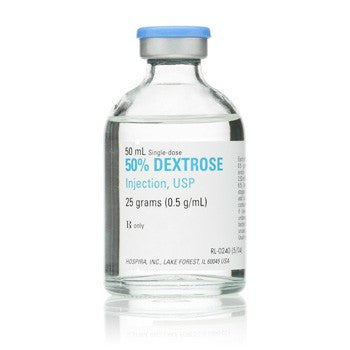Dextrose 50% Injection Vials 50 mL by Pfizer 25/tray (Rx)
How to Order:
You will receive instructions on how to create an account along with Rx Ordering Details.
(Note: Acceptable licenses must have Prescriptive Authority in the license issuing state.)
Sterile Water for Injection 100 mL Glass Vials are used as a solvent or diluent for the preparation of medications intended for injection. This sterile, pyrogen-free water is suitable for dissolving or diluting drugs to facilitate their intravenous, intramuscular, or subcutaneous administration. Its use ensures that medications achieve the desired concentration and compatibility for safe therapeutic application. The glass vial helps maintain the sterility and integrity of the solution, making it an essential component in pharmaceutical and medical settings.
Pfizer Injectables 50% Dextrose Injection is a sterile, nonpyrogenic, aqueous solution of dextrose in water for injection. Dextrose, USP is a hexose sugar polymer that is a source of energy for body tissues. The solution is intended for intravenous administration. The solution provides a source of water and electrolytes, and may be administered by the intravenous route to patients with fluid and electrolyte depletion.
50% Dextrose For Injection is a sterile, nonpyrogenic hypertonic solution of dextrose in water for injection for intravenous injection as a fluid and nutrient replenisher.
Details and Features:
Volume: 50 mL per vial
Concentration: 50% Dextrose (500 mg/mL)
Packaging: 25 vials per tray
Use: Primarily used for the treatment of severe hypoglycemia, insulin shock, or as a carbohydrate source in parenteral nutrition
Administration Route: Intravenous
Mechanism of Action:
Dextrose 50% Injection works by rapidly increasing blood glucose levels. Dextrose (glucose) is a simple sugar that is quickly absorbed into the bloodstream, providing immediate energy and raising blood sugar levels. This rapid infusion of glucose into the circulation is effective for patients experiencing low blood sugar levels, thereby restoring them to normal or closer-to-normal ranges.
Warnings:
-
Hyperosmolarity: The high concentration solution is hypertonic and can irritate veins. It should be administered carefully, usually through a central vein, to prevent phlebitis or thrombosis.
-
Extravasation: Care must be taken to avoid leakage of the solution into surrounding tissues, which can cause tissue damage.
-
Fluid and Electrolyte Imbalance: Rapid administration or high doses can result in fluid shifts and electrolyte imbalances, especially in patients with renal impairment or fluid restrictions.
-
Compatibility: Do not mix with blood or blood components due to the risk of pseudoagglutination.
- Caution in Diabetes: Use cautiously in diabetic patients, as it may significantly impact their insulin requirements.
Side Effects:
Potential side effects from the administration of Dextrose 50% Injection can include:
-
Local Reactions: Pain or irritation at the site of injection, phlebitis, or thrombosis.
Metabolic Disturbances: Hyperglycemia (high blood sugar), glycosuria (presence of glucose in urine), and electrolyte imbalances.
-
Overhydration: Particularly in patients with compromised renal function or fluid overload states.
- Infection Risk: As with any intravenous product, the risk of infection is present if aseptic techniques are not maintained.
This product should be administered by healthcare professionals experienced in the handling of concentrated glucose solutions, and it should only be used according to specific medical guidance tailored to the patient's needs. Regular monitoring of blood glucose levels and electrolytes is advised when administering Dextrose 50% Injection.



